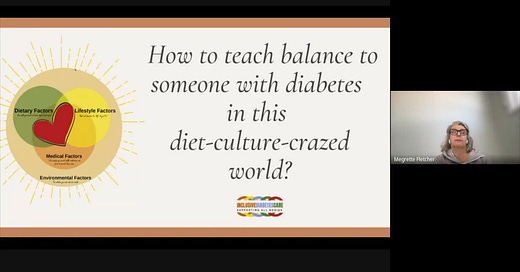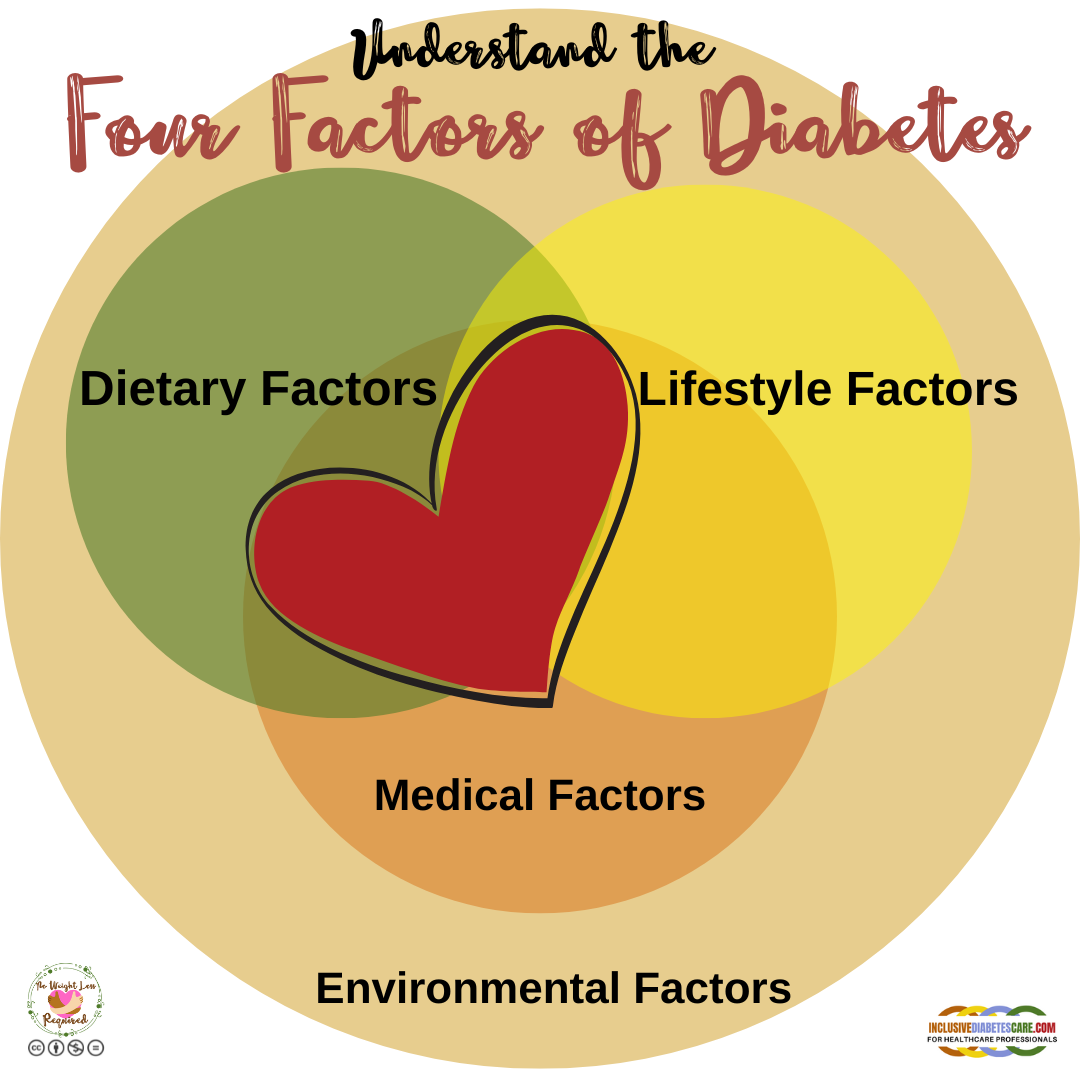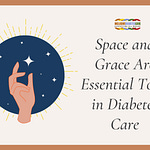Diabetes is a complex condition, but it often seems the pathophysiology gets ignored because diet culture has made clients believe “Weight loss can cure diabetes.”
What is diet culture? Diet culture is a system of beliefs that values weight, appearance, and thinness over other areas of health, which culminates in or contributes to oppression and inequity.
You know diets don’t work and you want to shift the conversation from extreme changes to balance but the question remains. How? Where would you begin? Join us as we share how you can teach balance without glorifying restrictive eating or extreme lifestyle changes by using the Four Factors of Diabetes Method.
To start, let’s name the Four Factors of Diabetes, which include: Dietary, Lifestyle, Medical, and Environmental.
Dietary Factors are simply what a person eats. It can be expanded to include access, culture, and preference, but for now let’s keep it simple.
Lifestyle Factors can be explained as the ‘style’ someone would use to describe their life. For example, would you describe your life as calm, full, consistent, busy, restful, and so on? Your answer is the ‘style’ of your life right now.
Medical Factors include the underlying pathophysiology, medication, labs, tests, immunizations, risk factors, and prevention.
The Environmental Factors include the outer world (state, town, job, and home) and your inner environment, which refers to your thoughts and feelings.
How do the Four Factors of Diabetes counter diet culture (defined as a system of beliefs that values weight, appearance, and thinness over other areas of health, which culminates in or contributes to oppression and inequity)?
First – The four factors look at the complexity that is part of diabetes instead of focusing on one aspect - diet, weight loss, or appearance. Diet and food are important but the emphasis on diet can create the false belief that diet is the most important aspect of diabetes care.
Second – The factors also include a look into the ‘style’ of a person’s life, which is much greater than their physical activity. Issues like medication adherence, sleep deprivation, and chronic stress all play a role in blood sugar management.
Third – The four factors include the essential medical role, in both the treatment and understanding of diabetes. Here, we can talk about the reality that 88 percent of people with diabetes take medication or that a big part of diabetes care includes understanding risks and managing unexpected problems.
Fourth – The four factors also discuss the environment, including issues of privilege, access, and the inner world of thoughts, feelings, and diabetes distress. This aspect can help you talk about both internal and external oppression and the many real struggles people with or at risk of diabetes face.
Fifth - Best of all, the four factors open up the conversation to include balance! Doing so allows you to move away from perfectionism and the either/or thinking so prevalent in diet culture. You can talk about what balance, not perfection, might mean to clients and help encourage more productive conversations by asking, “What steps can you imagine taking that might result in a greater sense of balance?“ This patient-centered approach is empowering and effective because you are including the client in the process!
“You want to understand more about diabetes and learn what are your options for treatment."
Welcome!
My name is Megrette Fletcher. I will be your instructor. I am a weight-inclusive diabetes care and education specialist for the last 30 years. I am excited to share with you the Four Factors of diabetes. This is a powerful tool to help clients understand how they can manage their diabetes by focusing on balance.
Key points in your learning.
The 4 Factor explains WHAT options (if any) can be modified to promote blood sugar control.
You can use each factor to explain the underlying pathophysiology of diabetes.
You can also share how diet culture can impact diabetes care by shifting a person out of balance.
The GOAL of this handout is to introduce the idea of balance vs. striving.
Four Factor Poster
Did you know you can purchase CPE for this program?
EMR Swipe file
The patient was educated on the Four Factors of Diabetes. A handout was provided.
Education reviewed dietary, lifestyle, medical and environmental factors associated with diabetes. Explored -/+ of change.
Teaching reinforced that diabetes is a complex condition and explored the patient past lifestyle change experiences: [identify if these were effective or unsustainable: If effective, pull to reintroduce. If unsustainable, pull for possible changes or modifications that would make them effective. If this isn’t possible, encourage the patient to continue to explore options.]
Affirmed the value of making small changes.
Affirmed the need for life balance.
After education, the overall plan is for the patient to focus on balancing the four factors.
The goal that the patient will work on between sessions is:
[Use your systems SMART goal format]
Examples of Weight Inclusive Smart Goals:
To create balance I am going to focus on getting regular meals. My goal is to eat something breakfast every morning.
OR
To create balance I am going to focus on getting regular meals. My goal is to have a moderate amount of carbs in my meals, somewhere between 30-75 grams for breakfast.
This might include: List of options
OR
To create balance I am going to focus on getting enjoyable movement. My goal is to walk for 20-30 minutes 3 days a week.
OR
To create balance I am going to focus on getting outside at my lunch break. My goal is to walk around the building at lunch 4 times a week.
OR
To create balance I am going to focus on getting some time for personal reflection. My goal is to use my meditation app for 10 minutes before bed, 3 days a week.
OR
To create balance I am going to focus on getting enjoyable movement. My goal is to walk for 20-30 minutes 3 days a week.
OR
To create balance I am going to focus understanding my blood sugar in the morning. My goal is check my blood sugar when I wake up each morning.
OR
To create balance I am going to focus taking my morning and evening medication. My goal is to fill up my medication caddy each week, to help me take my medication more consistently.
Learning Objectives
State three ways diet culture can move clients out of balance and assume that diabetes care is solely focused on diet.
Define the four factors of diabetes
Complete the teaching activity using the Four Factors of Diabetes Handout
Performance Indicators
8.2.1 Engages in educational activities to maintain knowledge and obtain new knowledge of diseases and clinical conditions.
9.3.5 Uses a variety of strategies to deliver education.
9.6.8 Develop counseling or coaching goals in collaboration with clients.
References
2022 Standards Of Care Diabetes Care December 2021, Vol.45, S1-S2. doi:https://doi.org/10.2337/dc22-Sint
Trends in diabetes self‐management education: Where are we coming from and where are we going? A narrative review. Hermanns, N., Ehrmann, D., Finke‐Groene, K., & Kulzer, B. (2020). Diabetic Medicine. https://doi.org/10.1111/dme.14256
The consequences of a weight‐centric approach to healthcare: A case for a paradigm shift in how clinicians address body weight. Mauldin et al. - Nutrition in Clinical Practice - 2022















Share this post